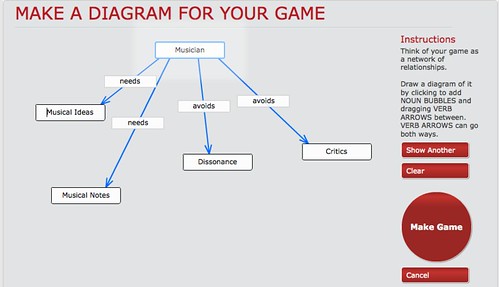
Tomorrow, I head out to the Berkshires for the annual conference and professional development event of the Massachusetts Teachers Association. Tomorrow night, I am taking part in the MTA’s Ed Talk, which is billed as a local version of TED Talks. I’m really looking forward to being part of the event, but it has been a struggle to create a meaningful presentation in a seven-minute limit. Plus, I am trying to keep in mind some of the things that make TED special: high interest, use of humor, pacing.
I had all sorts of ideas for my topic on video game design in the classroom. I thought it would be cool to come on stage with a massive inflatable game device. I couldn’t find any that didn’t cost an arm and a leg. (but I still have an idea that I am pursuing here.) Then, I thought: I’ll start out by playing one of my student’s games on the big screen. That might have worked (I intended to mutter loudly as I hit obstacles) and I even did a video capture of it, just to time it out. It was way too long, and so, I scrapped that, too.
In the end, I will do my best with injecting some humor and use pacing as best as I can, and hope that my seven minutes generates enough interest in the audience (the Ed Talks will be filmed and shared on YouTube) to spark some thinking of why we need to help our students make the shift from player to creator, and how game design connects nicely with writing process theories.
Here is the announcement info from MTA about the event, which features some very interesting folks and I am sure they are going to be lighting up the stage with some great ideas.
Heading to MTA Summer Conference at Williams? Join us Wednesday, August 8, at 7:30 p.m. for ED Talks.
Come hear 11 new “ideas worth sharing” about education and community presented in the style of TED Talks. Eleven speakers – a student, a vice principal, two community college professors, K-12 educators and a community activist around among them – will offer up their viewpoints in five- and seven-minute presentations.
The presenters are:
- Suzy Brooks, a third-grade teacher in Falmouth, tech enthusiast, MassCUE Pathfinder and Girl Scout. [@simplysuzy]
- William Burkhead, assistant high school principal in Plymouth and athletic coach. [@northeagles]
- Dan Callahan, K-5 instructional technology specialist in Burlington and chairman of the Board of Directors for the Edcamp Foundation. [@dancallahan]
- Kevin Hodgson, sixth-grade teacher in Southampton and technology liaison with the Western Massachusetts Writing Project. [@dogtrax]
- Lily Huang, public education organizer with Jobs with Justice.
- Katrina Kennett, high school English teacher in Plymouth in search of good books and bold ideas. [@katrinakennett]
- Diana Marcus, fifth-grade teacher, tech enthusiast and president of the Burlington Educators Association. [@pgroom209 and @marcusBEA]
- Jason Pramas, artist, photojournalist, (non-union adjunct) communication professor and activist.
- Chelsea Slater, student and vice president of the Vice President of the LGBT Student Union at Bunker Hill Community College.
- Wick Sloane, Inside Higher Ed columnist and Bunker Hill Community College professor.
- Mohamed Zefzaf, Massachusetts Bay Community College professor and ESL teacher.
ED Talks will take place in Hopkins Hall 001 (Lower Level). The program is being coordinated by MTA members Camille Napier-Bernstein (Natick) and Monica Poole (MCCC).
ED Talks will be video taped and available for viewing soon on MTA’s YouTube channel.
See you there, if you are there, and if not, see you on YouTube!
Peace (in the game),
Kevin










